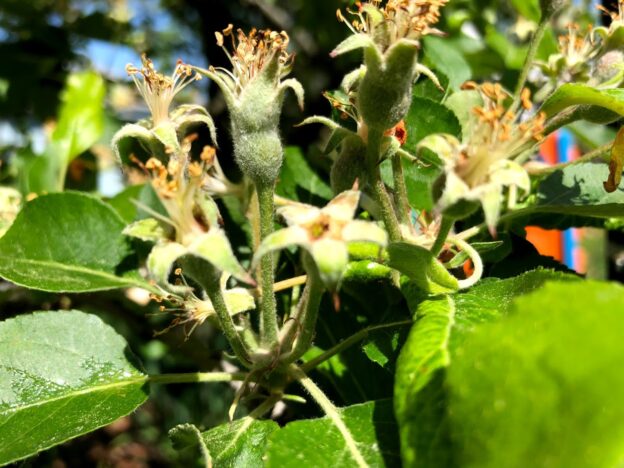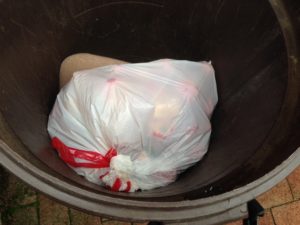If you haven’t yet, get your sprays and protection together. Right now (if your flowers have finished blooming), you can start spraying, and soon bagging, your apples.
This year I’m going to spray a mix of pure neem oil and BtK to protect from a variety of soft-bodied insects and caterpillars.
By waiting until the flowers are done, you’re protecting pollinators, but please be careful not to spray flowering plants that may have pollinators on them. I’ll do this 2 or 3 times over the next few weeks, spraying the entire tree but paying special attention to leaves that may have damage already, and spraying the trunk of the tree to kill any caterpillars that may be making their way up from the soil.
In one week or so, the apple clusters will be large enough to thin and bag. Each cluster will (usually) have five apples. Painful as it is, you want to remove four of them.
I know, it hurts. It is painful and difficult and you feel terrible doing it but it is the right thing to do for several reasons.
1. Thinning the apples allows the tree to put more energy into the remaining apples, making them larger.
2. Trees that expand all their energy trying to grow all the apples often produce every other year – a cycle not easily broken.
Finally, you’re going to want to protect the ripening fruit from other insects (plum curculio, apple maggot and more). Rather than spraying the trees over and over again, I like to bag the remaining apples with drawstring organza bags.
Slip an organza bag over the apple, pull the drawstring, move to the next apple. It goes very fast. Many people like to use paper bags, ziplock bags with a corner cut off and specialty bags made for just this purpose. Use whichever you prefer. I find the organza bags fast and easy and I can reuse them year after year (as long as the squirrels don’t destroy them).
In the past I’ve used Surround, which is very fine kaolin clay. Spraying the clay also reduces the need for pesticides. The color and/or texture of the clay confuses some insects and they decide to look elsewhere for a meal. I found that it worked okay in some instances but only when the trees and fruit were thickly coated with the clay, which requires multiple applications during the season. Bagging is required only once.
Some will recall that a tree covered in bags looks… ridiculous. I get lots of fun questions about our tea bag tree as well as polite people who just kind of look at the tree… for a long time… without saying anything in hopes the answer will become obvious.
Despite that, and the time it takes to bag a few hundred apples, I find it the best option as far as time, personal energy spent, and doing less harm to the environment.
And for those who will tell me that this doesn’t work for people with lots of apples: I agree with you. The idea of bagging thousands of apples is difficult to justify for a home grower. However, for the gardener with only a few trees, wanting to get actual fruit but not interested in repeatedly spraying pesticides that kill lots of beneficial insects at the same time, the above method works really well.


